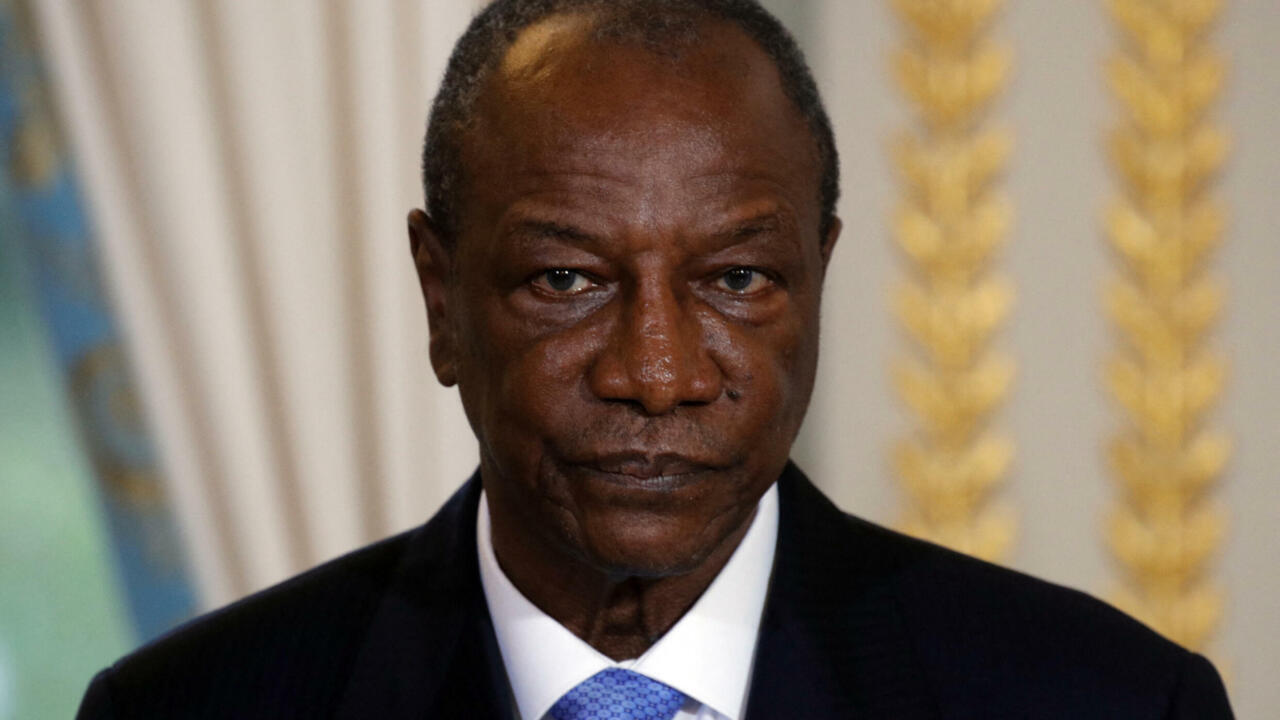His opponents accuse him of having carried out an "electoral hold-up".
Less than a year after his controversial re-election to a third term, Guinean President Alpha Condé was arrested on Sunday (September 5) by the army, which announced the dissolution of institutions, the closure of borders and the establishment of curfew.
"The whole Guinean army, from Nzérékoré to Conakry, we will join hands to help the country" and "put an end to the Guinean evil", declared the head of the Group of Special Forces (GFS), Mamady Doumbouya, instigator of the coup, at the microphone of France 24, confirming the abrupt end of the president's reign after eleven years in power.
An operation of disconcerting speed, without bloodshed, which further strengthens the control of the military in the sub-region.
The head of the special forces group, Mamady Doumbouya, said in an exclusive interview with France 24 that his men were holding President Alpha Condé.
© France 24
00:48
Authoritarianism and social crisis
In October 2020, a few weeks before the presidential election in Guinea, President Alpha Condé, candidate for a third term, came under fire. "It is extraordinary that I, who fought for forty-five years, I am considered an anti-democratic dictator!", He is indignant then in an interview with France 24.
Ten years after his accession to power, the first democratically elected president of Guinea, historic opponent of dictatorial regimes, is in turn accused of authoritarian drift. He had the Constitution amended, which fixes a maximum of two presidential terms in order to be able to stand again. A successful bet, since it earned him to be re-elected with nearly 60% of the vote on October 24, 2020, but which considerably tarnished his image. "Alpha Condé is allergic to criticism and his model of governance is not to discuss with the opposition, radical as moderate", explains on France 24 Doudou Sidibe, teacher-researcher in political science at Gustave-Eiffel University. "This has created a tension in Guinean political life,which ended up pushing the military to take power to satisfy the needs of the population. "
For Alioune Tine, founder of the pro-democracy think tank AfrikaJom Center and former close friend of Alpha Condé contacted by France 24, the sling facing the president goes far beyond the political field: "He had come to exercise total repression, that this is vis-à-vis the opposition, civil society but also international organizations, "he laments. "Myself, who have actively supported his democratic commitment in the past, I paid the price, in February, when my conflict prevention mission in Guinea was abruptly interrupted without just cause, because it did not please the Some leaders like Paul Kagame in Rwanda manage to conduct this kind of policy by hiding behind economic development and social peace. Alpha Condé, him,cannot rely on such arguments. "
In this country plagued by economic difficulties aggravated by the Covid-19 pandemic, the increase in several taxes, decreed in July by the government, in particular on gasoline, has further accentuated the feeling of abandonment of a party of the population and resulted in violence.
Sunday, the announcement of the arrest of Alpha Condé was greeted by scenes of jubilation in several districts of the capital Conakry.
A regional context favorable to the military
While some observers were astonished at the ease with which the military had managed to seize power in Guinea, few said they were surprised at the occurrence of a military coup to oust the former democrat, now widely regarded as a dictator. A scenario all the more conceivable since it had already occurred in neighboring Mali in August 2020, to oust President Ibrahim Boubacar Keïta, also facing a deep social and political crisis.
At the time, however, the Guinean president said that such a situation could not occur in his country: "There has never been a coup in Guinea. The army took power after the death of the president. Sékou Touré. Then the army took power after the death of President Conté. Guinea has never had a rebellion, never had a civil war, never a coup d'etat. Since I came to power ], the army has been reformed. Today, we have a republican army. So the situation has nothing to do [with Mali] ", he declared in October 2020 on France 24.
A few months later, in April, another country in the region passed into military hands, Chad, where a military council, formed and headed by the son of late President Mahamat Idriss Déby, seized power despite constitutional rules. A transition then supported by France despite its undemocratic character. "The contagion of military takeover is today an undeniable phenomenon in the region", judge Alioune Tine. "This trend is notably due to the loss of influence of international and regional organizations supposed to ensure respect for democracy, such as the African Union, ECOWAS (Economic Community of West African States), the United Nations or the European Union, facing countries like China,Russia or Turkey which extend their influence in Africa and do not ask for any democratic counterpart to do business. In this context, why would the Guinean army protect a leader who is admittedly elected but who reigns alone as a tyrant? "Asks the former supporter of Alpha Condé." By not allowing a democratic option to exit power, the Guinean president has himself put in place the elements of his fall. And he was the only one who didn't see it coming. "And he was the only one who didn't see it coming. "And he was the only one who didn't see it coming. "
The summary of the week
France 24 invites you to come back to the news that marked the week
I subscribe
Take international news everywhere with you!
Download the France 24 application
google-play-badge_FR

